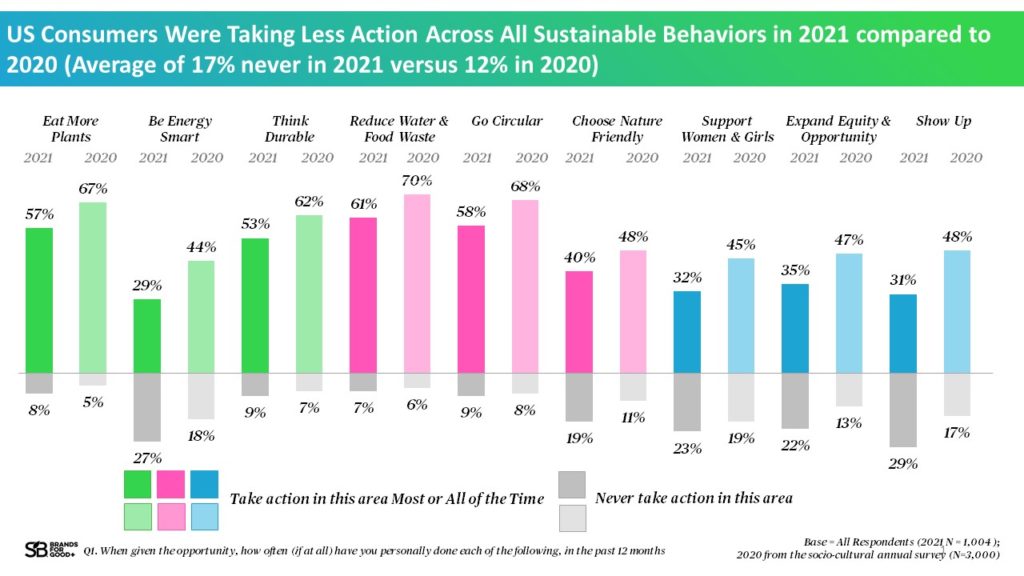New research from Sustainable Brands and Ipsos highlights consumer attitudes toward social versus environmental issues and carbon transparency.
Sustainable Brands has conducted several rounds of research over the past couple of years, tracking the changing motivations and behaviors of consumers and their understanding of current social and environmental issues, alongside individual brand perceptions. Through this collaborative research, the brands who make up the SB Brands for Good collective have used this data to frame their consumer strategies and creative messaging in consideration of the evolving attitudes related to the most pressing socio-cultural trends that our society faces today.
In partnership with Ipsos, SB’s latest Brands for Good study (conducted in December 2021) surveyed 1,000 US consumers. This study was designed to measure their progress on adopting sustainable lifestyles across the Nine Sustainable Behaviors. It also probed their general understanding around the interconnectedness of social and environmental issues, which specific issues they believe are priorities to solve, and their overall familiarity of the term ‘carbon footprint’.
When looking at the Nine Sustainable Behaviors that brands and consumers can take together to create the most impactful positive change, the data shows that US consumers report that they are taking action on Reduce Water and Food Waste, Go Circular, and Eat More Plants most frequently. However, when comparing the stated actions taken across all Nine Sustainable Behaviors in 2021 versus 2020 there is a significant decrease across the board. US consumers are taking sustainable actions an average of 17% less often over the prior year, potentially due to the continued emotional and financial strain from COVID-19, as government support decreases but the pandemic rages on.
When asked what barriers they were facing when trying to live more sustainably, similar to our 2020 research, the number one response from consumers surveyed was that it was too expensive, followed by not knowing where to start. While price is a complex issue that has been compounded recently by inflation, brands can immediately help consumers take steps to live more sustainably through inspiration and education.

The survey also asked respondents to rank social and environmental issues by the most important to solve. US consumers ranked Climate Change as the number one most important issue to solve, followed by Homelessness, Access to Healthcare, Gun Violence, and the Spread of False / Misleading Information. While a major environmental concern sits at the top of the list, the survey respondents named societal issues as four out of the top five most important issues that require solving. Among the issues presented, respondents prioritized the impact of social issues at the local community level over the global level. Conversely, they indicated that it was more impactful to prioritize environmental issues at a global level versus a local level. This shows an opportunity for mission-driven brands with a social purpose to be leaders in this space by showing up for local communities and supporting critical societal issues.
Taking a deeper dive on environmental issues, the study probed consumer awareness on the term ‘carbon footprint’. Results showed that consumers surveyed had a moderate and reasonably accurate understanding of this term. However, respondents do not seem to have a full understanding of how their actions impact their personal carbon footprint. When presented with a selection of actions, just over half of US consumers surveyed equated actions related to energy having the greatest impact on their carbon footprint — both switching to renewable sources and taking actions to conserve. Even so, the research revealed that respondents had a substantial lack of awareness on the connection between their personal carbon footprint and what they choose to eat. This is an area that brands connected to the food and beverage industry can lean into by educating consumers about the positive impact they can have when making sustainable food choices — including eating more plant-based foods, choosing locally sourced and nature-friendly foods, and reducing food waste.
For an in-depth look at this report, including insights on carbon footprint labeling, demographic breakdowns, and the full scope of consumer-prioritized social and environmental issues, visit the Brands for Good Socio-Cultural Trends webpage and download the highlights report. Understanding consumer intentions and actions towards sustainable lifestyles is a vital step for brands. These insights provide the backbone for creating impactful campaigns that drive sustainable consumer behavior change, and make these behaviors accessible, inspirational and rewarding.
Kristen Tetrick
Brands for Good, Sustainable Brands
